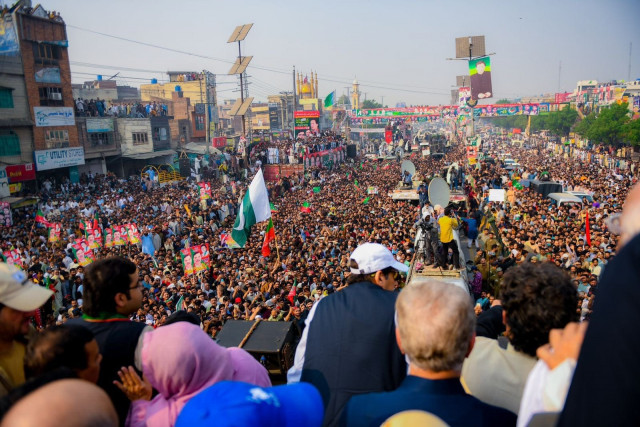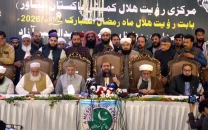Snap polls, elections after bloodshed or martial law?
Political experts believe it is less likely that the govt will fall because of PTI’s long march

Any wise democratic person would choose ballot over bloodshed or martial law if it came to picking one.
Nobody is disagreeing that the political change being sought and promised should come through people’s votes.
The only difference between the ruling alliance and the PTI is timing of the next general elections.
PTI chairman and former premier Imran Khan wants snap polls as he feels that the only hurdle in his party’s return to power is the holding of the elections next year. Before that, he also wants to have a say in the appointment of the new army chief.
However, his party’s statements keep on changing on this issue.
On some day, the PTI says it does not care who appoints or becomes the new chief of army staff (COAS). On other occasions, the party demands that the appointment of the new army chief should be done on merit.
Then there are days when the PTI feels Prime Minister Shehbaz Sharif has no right to appoint the new army chief at all, saying only a new government should make this move.
The coalition government, however, has rejected the demand for snap polls, sensing that holding the elections right away would tantamount to allowing the PTI a walk to the victory stand, especially after it burnt its political capital by increasing the prices of petroleum products and not being able to bring down inflation.
Above all, the coalition government can feel the change in the people's mood that went berserk once the inflation hit them.
Amusingly, both sides have been claiming that the other will run away long before the PTI's long march, which kicked off on October 28 from Lahore in an attempt to press the government for snap elections, reaches Islamabad.
PTI leaders claim that the government will abandon the federal capital before “a sea of people” will wash everything away with it.
The rulers find it funny and usually laugh off such claims.
They tell the other side that they have a “Hakeem Sahib” in their ranks – Interior Minister Rana Sanaullah – who will deal with them in such a way that they will repent their decision of challenging the writ of the State.
Political analysts believe no matter how they frame the political scenario, it is actually about the appointment of the military chief and having cordial relations with the security establishment that both sides are looking forward to.
The PTI chief is giving hard-hitting statements against the security establishment but at the same time, he is also giving an impression that talks with the powerful stakeholders are under way.
He is saying he will not talk to the government but with the “ones” who have “power” and whom the ruling alliance’s leaders used to meet.
Following an unprecedented news conference of the spy chief, wherein he accused Imran of excessively telling lies and maintaining double standards, the ruling side has also slammed the doors, for now, especially, after PML-N supremo Nawaz Sharif told PM Shehbaz not to engage in talks with the PTI chief and give him any “face-saving” in connection with his long march.
Nevertheless, from calling his political struggle a jihad to showing willingness to sacrifice his life for it, Imran did not hesitate to up the ante whether it was his opponents or the military high-ups.
He had crossed the stage of labelling his opponents as “thieves and traitors” long ago but he constantly reminds people about all these adjectives as they serve nothing short of a booster.
The other side too has chosen different words for Imran. Their favourite these days is fitna (mischief).
They also love to call him a “foreign-funded agent, “compulsive liar” and the one who can “sacrifice or destroys anything that comes in his way to power”.
That is where the three options have surfaced; peaceful and fair snap polls, elections as per schedule after bloodshed or polls after the country once again goes through a martial law -- without knowing how long it will last.
Imran’s statement that he does not care even if military takes over the country has drawn severe criticism against him from different quarters.
His party leaders’ statements about coming equipped with weapons to the federal capital and having men and guns ready at Islamabad’s border is simultaneously being conceived as an attempt to have bloodshed as well as preparations of finding an escape route to call off the long march.
The political battle, where a democratic facade used to be a key requirement, has gone with the wind.
Polarisation appears to be at its peak but the political experts fear the worst has yet to come as the PTI is marching towards the capital while the government is busy installing iron gates and placing containers across the city to defend what used to be governed by the other side not so long ago.
The political experts believe that it is less likely that the government will fall because of the long march but the chances of a serious confrontation cannot be entirely ruled out, especially, if the rulers call the military to prevent a siege or overcoming potential threats.
For political parties, it is more about increasing their popularity and winning the next elections than anything else, they say, warning that only the security establishment’s grip will further tighten over the civilians amid all the chaos.



















COMMENTS
Comments are moderated and generally will be posted if they are on-topic and not abusive.
For more information, please see our Comments FAQ